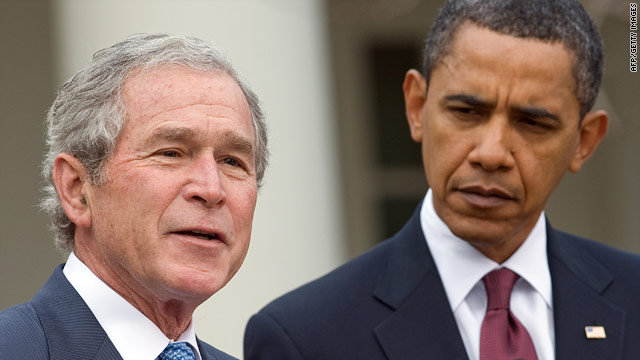 Washington When President Barack Obama lays a wreath at the 9/11 Memorial on Thursday, he had hoped to be joined by former President George W. Bush. But in declining this invitation, Bush has left some observers puzzled, while others were supportive of his decision.
Washington When President Barack Obama lays a wreath at the 9/11 Memorial on Thursday, he had hoped to be joined by former President George W. Bush. But in declining this invitation, Bush has left some observers puzzled, while others were supportive of his decision.Conservative columnist Michelle Malkin says it's odd that Bush, who made it his mission to hunt down Osama bin Laden, will not appear alongside Obama. The trip to New York comes just days after the president announced bin Laden's death by U.S. forces in Pakistan.
"It would be an extraordinary -- dare I say 'unprecedented,' to borrow one of Obama's favorite words? -- act of political maturity, good faith, and transcendent unity against our common jihadi enemies," Malkin wrote on her blog. "Dubya needs to change his mind -- for America's sake."
In a statement, David Sherzer, spokesman for the ex-president, said Bush "appreciated the invite, but has chosen in his post-presidency to remain largely out of the spotlight. He continues to celebrate with all Americans this important victory in the war on terror."
White House Press Secretary Jay Carney said Wednesday that Obama invited Bush because "he had hoped that if President Bush were able to come, that he would join the president in visiting the the World Trade Center site."
"We completely understand that he's not able to come, but that the invitation was made in that spirit," he added.



RELATED TOPICS
CNN senior political analyst David Gergen said there's a good reason why Bush decided to sit this one out.
"There are people who believe that President Obama should have given more credit to President Bush in that famous speech that he made a couple of nights ago. There is sourness around the president, but I don't think that's what motivates President Bush," Gergen said Wednesday.
"He and his family ... have an old-fashioned view, that we only have one president at a time," added Gergen, who has served in Democratic and Republican administrations. "I think this is quite genuine on the part of President Bush."
Still, Malkin insists that Bush's visit would show the world that both parties stand together on at least one issue.
"Side by side, the Democratic commander in chief and his GOP nemesis would join hands at the former site of the World Trade Center towers, pay heartfelt tribute to the thousands of victims of Osama bin Laden here at home and around the world, and pledge continued support for our military, intelligence, and homeland security personnel at home and around the world," she added.
Bush helped unite the nation in the days after the September 11 attacks, which killed more than 3,000 people. Bush's appearance alongside rescue workers on the smoky rubble of what once was the World Trade Center was one of the most memorable moments of that time.
LZ Granderson, a CNN.com contributor, writes that "in a perfect world, both parties would come together to celebrate what bin Laden's death means to the country's sense of closure."
However, he adds that Republicans use this opportunity to focus on wedge issues. "But the truth is some Republicans have already left the party and others didn't even bother showing up," he said.
However, he adds that Republicans use this opportunity to focus on wedge issues. "But the truth is some Republicans have already left the party and others didn't even bother showing up," he said.
Despite the criticism, former Bush officials argue that the ex-president deserves a lot of the credit for the capture and killing of al Qaeda's leader.
"It was also important that President Bush put in place counterterrorism strategies and policies, efforts that the military and intelligence have been making over the years," former Secretary of State Condoleezza Rice said on CNN's "American Morning" on Tuesday. "To work together better to achieve that kind of level of integration didn't happen yesterday. This is something that has been happening for quite a long time."
In another CNN interview, former Defense Secretary Donald Rumsfeld praised Bush's controversial decision to imprison low-level al Qaeda officials.
"It is those people that know the habits and locations of the senior people. It is a good thing that the people were held and that there were interrogations," he said. "That information was patched together over a period of time."
Bin Laden's death has shown mixed results so far for Obama, at least when it comes to the polls.
A CNN/Opinion Research Corp. poll taken Monday showed that the death gave Obama no large bump in his approval ratings.
Obama's approval rating, now at 52%, is up 1 percentage point from a poll conducted Friday through Sunday, though it's up 4 points from Obama's 48% approval rating in early April. All interviews in the poll taken this weekend were conducted before the announcement of bin Laden's death.
A Washington Post-Pew Research Center poll taken Monday indicates that Americans are giving more credit to Obama than Bush for bin Laden's death. More than three out of four Americans said Obama deserves a great deal or "some" credit, while 51 percent said the same about Bush. The same poll found Obama's approval rating up 7 percentage points -- 56% to 49% -- from an earlier survey.
Also the latest New York Times-CBS News poll saw the president's approval rating at 57%, up from 46% last month.
So how does the Obama's standing in the polls compare with Bush's rise after the capture of Saddam Hussein?
Bush's approval rating jumped 8 percentage points, from 55% to 63%, in the days after his December 2003 announcement that Hussein had been captured.
No comments:
Post a Comment